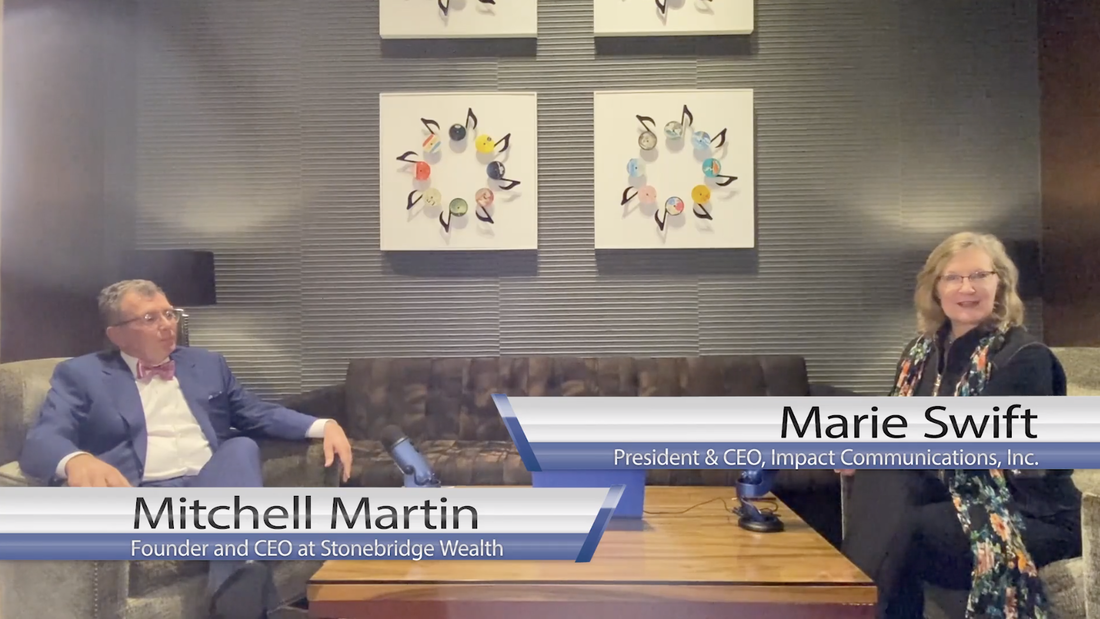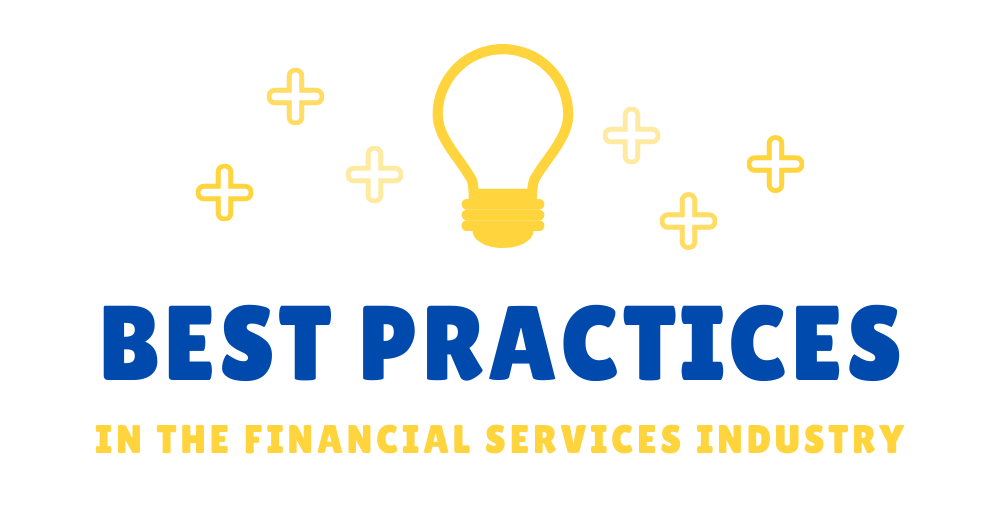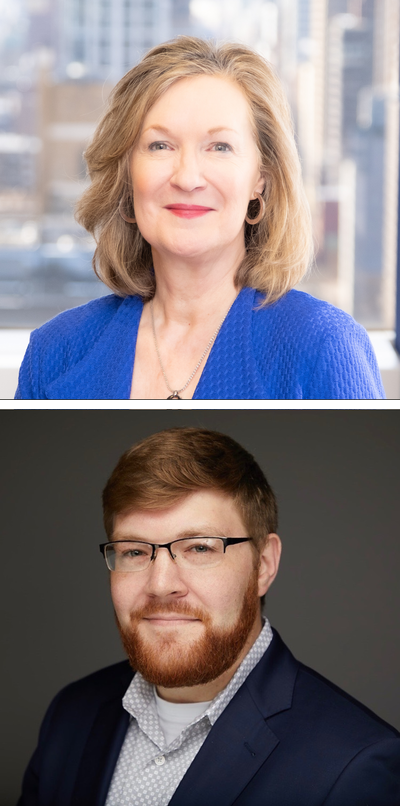Swift Chat with Mitch Martin: Achievement-Based Planning at the Crossroads of Fame and Fortune7/30/2022
In this Swift Chat episode, Marie Swift speaks with Mitch Martin, founder and CEO of Stonebridge Wealth Management, about his work specializing in financial planning for clients in the arts, entertainment and sports industries. The two discuss his passion to give people who have acquired wealth suddenly a person they can trust to give sound advice, his focus on achievement-based planning, and aligning a client's investments with their values.
Learn more about Stonebridge Wealth Management at www.StonebridgeAdvisers.com The clients' story is unique and it influences the advice that we ultimately provide. And so when we, pull the lens back and we talk about their story, we begin to think about what are the things, the components that light them up creatively, artistically? What are the things that they're impassioned about as an individual, what are their philanthropic interests? Do they want to give back to community?" ~ Mitch Martin, Stonebridge Wealth Management Transcript of Conversation
Marie Swift: All right. We are live here in Nashville and I am talking to Mitch Martin, and we are gonna do a quick Swift Chat to find out all about Stonebridge Wealth. And Mitch, you've been doing this for a while. So tell us a little bit about who you are and why you do what you do.
Mitch Martin: Well, it goes back 20 years actually, and It began with a vision in terms of creating a firm, a wealth management practice that would focus exclusively on arts, entertainment and sport. There are a lot of documentaries that oftentimes talk about this idea of the impact of misplaced trust, right? And so I had a passion to begin to change that rubric, if you will, an opportunity to begin to serve business managers, as well as their high profile clients at the crossroads of fame and fortune. Swift: Wow. So the crossroads of fame and fortune, and I imagine you have some fame and fortune in your client list and you can't talk about those people, but imagine you would have some interesting stories to tell and some friendships that have been made. I think you're purpose driven and that there's a reason that you're doing this, your value proposition and the reason you do it are pretty important to you. Aren't they? Martin: They are. Swift: So tell us about that. ACHIEVEMENT-BASED PLANNING Martin: Well, our mission at the end of the day is to help our clients achieve their greatest potential. And over the course of the last 20 years, we've spent significant time looking at what type of an environment will actually produce the greatest outcome for clients. And I think, you know, from our perspective in working with business managers, what we've learned is that there are very, very unique sensitivities, unique complexities with clients that are in the creative community at the end of the day. And, as I think about how we've built our business, the overall value proposition, our strategy, it's primarily focused on an idea of what we now describe as achievement based planning. Right? If you think about sort of our core clients today, if we talk about the creator community for a moment. Yeah. What we're looking at are pathways to create greater success in their terms, right. Our model has evolved. I mean, we were an early adopter of goals-based planning that, that that's now become achievement based planning. Cause I think, from my perspective, it's great to have a goal, right? But at the end of the day, what really matters is the idea of goal achievement. And so when we talk about this idea of achievement-based planning, we actually have framed it in terms of the WonderLife experience. And when we talk about WonderLife, what we're really talking about is the story of a client unfolding. Because it really matters. Their story is unique and it influences, the advice that we ultimately provide. And so when we, pull the lens back and we talk about their story, we begin to think about what are the things, the components that light them up creatively, artistically? What are the things that they're impassioned about as an individual, what are their philanthropic interests? Do they want to give back to community? So we begin with that starting point and then we begin to listen and begin to ask questions and engage in an honest conversation about obstacles and opportunities. And once we reach that point within this WonderLife type of an experience, we then begin to build some context. We begin to frame what they desire to be their career, life, and wealth goals. And then our task at the end of the day, Marie, is basically to help them achieve those objectives. THE WONDERLIFE EXPERIENCE Swift: So I love the 'WonderLife' term, and I also was looking at your website and you have 'the glory of your story' as one of the key phrases on your site. And I know that as you think about the people that you work with and your passion and your purpose, that there are many challenges that they face and you find a way to help them overcome those challenges. What are some of the challenges that people working in the creator economy face? Martin: Long list. But for our purposes today, probably the key factors are related to what I would describe as 'sudden wealth events' to begin with. In addition to sudden wealth, we're constantly dealing with the ebb and flow, the management of cash flow. Or, regular cash flow streams for our clients. We're dealing with the tensions that exist between career, life and wealth goals. Beyond that, we're working with their business manager to help manage liquidity events, which would include a lot of IP, intellectual property, related matters. The ability to create liquidity events for the sale of a back catalog, for example in addition to that creating royalty lending types of opportunities. So it is a long list at the end of the day, but remarkably different, right? As contrasted to other wealth management firms and the types of clients that they would ordinarily serve. Swift: Yes. Totally different than a business owner. I would say that there would be a lot of unexpected curves and maybe some expected curves that come with the work that you do. Martin: Yes, no question. But I think, what helps provide clarity is this achievement base, this WonderLife type, type of an approach. Because we get to a place where we can help them identify very, very specific goals. And I think part of the value proposition for us is to align the investment portfolios with those individual goals, with their values. And with their expectations over the longer run. Swift: I know you have some good institutional partnerships too. Would you touch on those? Martin: Yes, we have, we have a number of them, which range from our primary custodial relationship, which is Fidelity Institutional. Have a relationship with several different trust companies, probably the most prominent being SEI Private Trust Company. And a long list of what you would expect in this type of an environment, including firms like Advent, delivering the technology and a lot of the back office related work for us. THE ORIGIN STORY Swift: So how long have you been doing this work? Martin: Well, in total or as it relates to arts entertainment and sports? About 30 years, in terms of total time in the business. And I, but as I had mentioned earlier, the arts, the entertainment and the sports sensitivity really emerged about 20 years ago. And it was sort of interesting how that story evolved. Would you like to hear about it? Swift: Please. Martin: Yeah. Well, it was at LAX north of 20 years ago where due to a series of flight delays, and that would describe this as really being more serendipitous than anything else. But began a series of conversations with business managers. And, the question that really came forward was basically, is there a better way to deliver advice? Do we have the ability to shift advice, from the buy side to the sell side of the table, or another way, alignment of interest, right? What they didn't know is they were really contrasting, the term suitability standard versus a fiduciary standard. And so they asked, would we take 90 days, Marie, to take a look at, what are the different pathways forward and how do we begin to implement a strategy where we simply have an environment where we've limited conflicts of interest might be the best way to frame. So we took 90 days and we began looking at different opportunities, which included single family offices, multi client family offices. And then the whole RIA space, which 20 years ago... I mean, it was really a handful of firms, certainly early adopters kind of moving into that space. So basically where we landed was creating an independent, fee only RIA and then bolting onto that. What we describe as a multi client investment office, which is a significant differentiator. And so it was August of 2002 that we launched Stonebridge, it'll be our 20th year this August. Swift: Wow. Congratulations. So that's quite an accomplishment, right? So you must be governed by a regulatory body. The SEC. Martin: Yes, that is correct. ESCAPING THE SEA OF SAMENESS Swift: So there's another another guardrail there. So in closing, is there anything that you'd like to leave our listeners with? Martin: You know, probably. Four quick thoughts in terms of differentiating factors. And if you think about wealth management, if we think about financial advisory related services, there's a quote from Lady Gaga that talks about this idea of a sea of sameness, right? And so the question, the question becomes, what are the differentiating factors, for Stonebridge? And I think, first of all, it begins with our history. That we've served 20 years in this space working with high profile clients. Secondly is our commitment to the business management community. You know, the third piece would be related to our methodology in terms of the delivery of advice, we talked earlier about the WonderLife type of an experience about the idea of moving away from simply goals based planning to a wealth, rather to an achievement-based type of a structure or an experience from a client perspective. And then finally the fact that we work, in the creative or the creator, economy and deal with the unique complexities in that. I think, I mean, if I had to wrap up with a single point, the reason this is meaningful to me first and foremost is I'm a musician. And I understand the impact of misplaced trust. I understand the importance of focusing on your art, on your craft. And creating greater career earnings. And so I think, from my perspective, being in the position, of helping creators achieve not just greater career earnings or an increase in net worth, but the ability to live the life that they have imagined is just an extraordinary opportunity. Swift: Well, of course I have to ask you, what do you play? What kind of music? Martin: I'm a percussionist and actually fortunately a session musician that paid my way through college. So. Swift: Interesting. Interesting. Well, I've enjoyed this conversation. Thank you so much, Mitch Martin. Martin: Great. Thank you. Comments are closed.
|
About
|
|
Stay Connected
|
Phone: 913-649-5009
©2023 Impact Communications, Inc.
|





